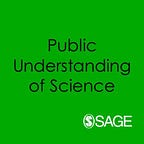An Ethics of Science Communication
Review by Kristian H. Nielsen
The major shortcoming of this book is that it is too short. As a result, the authors treat topics and cases in a superficial and sometimes misleading manner. Nevertheless, they have produced a timely book calling for ethical reflections on science communication.
Ethics are integral to all forms of communication. Indeed, as the authors of this book on science communication ethics state, “[c]ommunication is often presented as the moral act”. The authors highlight the ethical significance of communication by showing that professional codes typically define appropriate conduct in a given field by reference to proper ways of communicating: honesty, openness, accuracy, and accountability. These are fundamental principles of research ethics, but also journalism and PR ethics.
The authors note that science communicators draw on existing codes of conduct from these fields. They also acknowledge the dilemmas inherent to good science communication where such codes are not always enough. Science communicators convey robust scientific information in a manner that addresses the demands and concerns of their intended audience, while also seeking to mobilize critical debate about science and public participation in science.
Science communicators sometimes act as advocates for science. At other times, they address the institutional power of science and the financial and political interests involved in doing science. Science communicators disseminate science, but also criticize and even confront science.
Examining these dilemmas, the authors advocate a principle-based approach relying on the reasoned application of the following ethical principles that are appropriate to science communication:
- Utility: Science communicators ought to consider the value of what is being communicated and not, so that all individuals and groups involved are empowered and broader social and environmental concerns are taken into account.
- Accuracy: Science communicators ought to provide accurate information and ought to be able to justify any deviation from accuracy such as the use of fiction or narrative. Science communicators should acknowledge that science does not produce absolute truths.
- Kairos: The authors dedicate a full chapter to this term, which originates in classical rhetoric and refers to the right timing of communication. According to the principle of kairos, science communicators should seek the most appropriate opportunities for science communication while also adhering to the other principles.
- Generosity: Science communicators should recognize and appreciate other, i.e. non-scientific, forms of knowledge and experience. In other words, they ought to care for what others think and say.
The authors provide two examples showing how these principles apply to real-world ethical dilemmas in science communication. The first example involves Jennifer, a healthy 39-year-old woman, who decides to take a genetic test because her grandmother had died young from breast cancer. The test shows that Jennifer does not have the two genetic mutations known to increase the risk of breast cancer, but also that she does have a mutation linked to a higher risk of stomach cancer and may have to have her stomach removed. In this situation, the authors argue, the counsellor communicating the findings to Jennifer may well use the principles to guide her thinking and help her navigate the ethical nuances involved.
The other example is the 2009 L’Aquila earthquake, where volcanologists, following months of frequent, mostly low-magnitude, tremors, just one week before the earthquake occurred downplayed in public communication the risk of an impending quake. An Italian court in 2012 convicted six scientists and one government official for manslaughter based on their misleading of the public. (Two years later, an appeals court overturned the conviction of the six scientists and reduced the sentence for the government official.)
Ethical consideration of the case reveals that the scientists should have communicated the uncertainties of their scientific knowledge (accuracy) and discussed the (lack of) usefulness of volcanology for giving people advice on what to do when an earthquake looms in comparison with other types of knowledge (utility and generosity). In addition, they should have communicated this information before the earthquake (kairos).
The book certainly is relevant to contemporary science communication. Its major shortcoming is that it is too short. As a result, the authors treat topics and cases in a superficial and sometimes misleading manner. For example, kairos means more than just timing — it also relates to innovation and cognitive dissonance –and consequentialism certainly is not “a mechanical, algorithmic process for calculating which action is right or wrong”. Nevertheless, Medvecky and Leach have produced a timely book calling for ethical reflections on science communication.
Kristian H. Nielsen is associate professor in science communication at the Centre for Science Studies, Aarhus University, Denmark. He has published on the history and politics of science communication, most recently (with Per Hetland and Dick Kasperowski) a chapter on science communication in Scandinavian countries in T. Gasgoigne et al (eds), Communicating Science: A Global Perspective (ANU Press, 2020).
